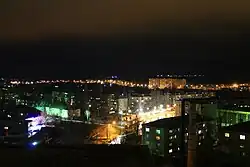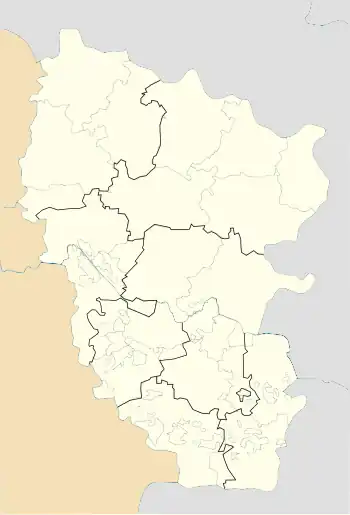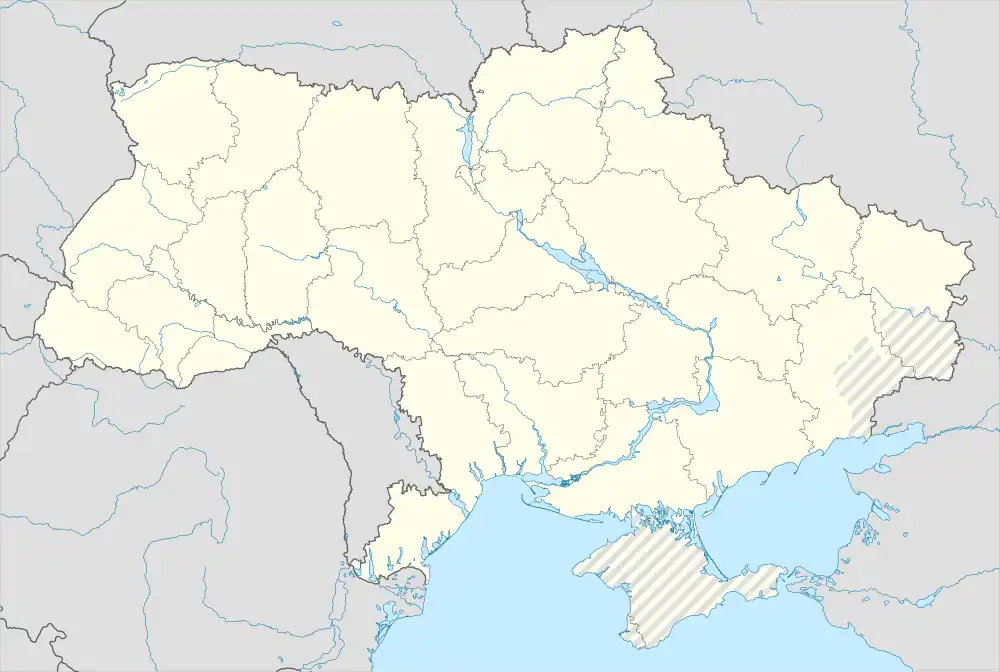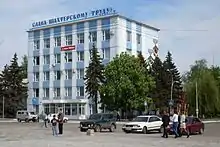Sorokyne
Сорокине | |
|---|---|
| Sorokyne / Krasnodon | |
 Sorokyne skyline | |
 Flag  Coat of arms | |
 Sorokyne Location of Sorokyne/Krasnodon  Sorokyne Sorokyne (Ukraine) | |
| Coordinates: 48°18′0″N 39°44′0″E / 48.30000°N 39.73333°E | |
| Country | |
| Oblast | |
| Raion | Dovzhansk Raion |
| Founded | 1914 as Sorokino |
| Renamed | 1938 |
| Government | |
| • Mayor | Yuri Borisovich Baklagov[1] |
| Area | |
| • Total | 77.33 km2 (29.86 sq mi) |
| Population (2022) | |
| • Total | 42,315 |
| • Density | 550/km2 (1,400/sq mi) |
| Postal code | 94400 |
| Area code | +380 6435 |
| Climate | Dfa |
| Website | krasnodon |
Krasnodon (Ukrainian and Russian: Краснодон) or Sorokyne (Ukrainian: Сорокине; Russian: Сорокино, romanized: Sorokino) is a city in Luhansk Oblast, eastern Ukraine. Located in the Donbas region, it is part of Dovzhansk Raion. Its population is approximately 42,315 (2022 estimate).[2]
Krasnodon came under control of pro-Russian separatists in early 2014, and was incorporated into the Luhansk People's Republic (LNR). Since then, it has been continually controlled by the LNR, and since 2022, explicitly by Russia.
History
20th century
In the early 1910s, rich coal deposits were discovered in the area of the Donbas around modern Krasnodon. Entrepreneurs flocked to the area, and a number of coal mines were dug. A settlement began to grow along the left bank of the Velyka Kamianka, a tributary of the Donets River, known as Sorokyne.[3] In 1914, the first coal was actually mined.[4] This year is usually considered to be the official date of founding of the settlement Sorokyne. In 1916, 3,105 people lived in Sorokyne, and 776 miners worked at the mines.[3]
Sorokyne saw fighting during the Russian Civil War, and changed hands several times.[4] The intense fighting destroyed the mines and most of the settlement.[3] Eventually, it was captured by the Bolsheviks in December 1919, who established stable control over Ukraine and established the communist Soviet Union on much of the former territory of the Russian Empire.[4]
The Soviet regime restored and modernized the destroyed mines, and began construction on new mines.[3] A local newspaper has been published in the city since September 1930.[5] Sorokyne became a major center of coal mining in the Donbas. On 28 October 1938, by a decision of the Presidium of the Supreme Soviet of the Ukrainian Soviet Socialist Republic, the mining settlement of Sorokyne was renamed to Krasnodon and given city status. By 1939, 22,220 people lived in Krasnodon.[4]
During World War II, Krasnodon was occupied by Nazi Germany from July 20, 1942 to February 14, 1943.[3] The Germans operated a Nazi prison in the town.[6] The Soviet resistance organization Young Guard operated in the city during the occupation. The Nazis would capture the Young Guardsmen and murder them by throwing them down mineshafts. Fifty-eight guardsmen in total are known to have been killed. After the end of the war, Young Guard have been commemorated with monuments and a memorial complex in Krasnodon.[3] On 27 September 1942, according to Soviet sources, the Nazis committed a particularly brutal massacre by burying alive 32 patriotic Soviet miners in the city park.[7] The Nazis also attempted to use the coal mines of Krasnodon, bringing in machines to harvest its natural resources.[4]
After the liberation of the city by the Red Army, the mines were once again reconstructed.[7]
21st century
Since 2014, Krasnodon has been controlled by the Luhansk People's Republic (LNR), a Russian puppet state, and not the Ukrainian authorities.[8] NATO released satellite data from 21 August 2014 and confirmed it showed a large column of armoured vehicles crossing into Ukraine from Russia through Krasnodon.[9]
In 2016, the city was renamed Sorokyne by Ukraine as part of decommunization reforms.[10] However, the name change was largely symbolic due to Ukraine not controlling the city. Since 2022, Russia has claimed the city as part of the LNR, a federal subject of Russia, following its declared annexation of the region.
In February 2023, LNR Head Leonid Pasechnik and Russian-installed mayor of Sorokyne Sergey Kozenko, and head of Krasnoyarsk Vladislav Loginov signed an agreement establishing Sorokyne (referred to in the documents as Krasnodon) and Krasnoyarsk as sister cities. Pasechnik said that the relationship will include "youth exchanges, infrastructure restoration, urban development, and sports development". Analysts see this as part of "wider government initiatives to erase Ukrainian identity among youth". The "youth exchanges" may be related to Russia's so-called "youth camps", in which Ukrainian children are "indoctrinate[d] with Russian political ideology".[11] On 25 September 2023, it was reported by both Ukrainian and Russian military sources that Ukrainian forces struck industrial facilities in Sorokyne.[12]
Economy

Krasnodon has historically been important for the mining of bituminous coal.[13] There is also a meat processing plant and a sewing factory today.[3]
Demographics
The population of Krasnodon was 70,400 in 1972, 53,000 in 1989, and 49,921 in 2001.[14]
As of the Ukrainian Census of 2001, the city was majority (66.3%) Russians, with a large minority (33.2%) of Ukrainians and small minorities of Belarusians (1.3%) and other ethnic groups (2.2%).[15]
Linguistically, the city is overwhelmingly Russophone, with 90.75% natively speaking the Russian language. The largest linguistic minority are native Ukrainian speakers, who make up 8.46% of the population. There are then several small linguistic minorities, with 0.17% natively speaking Romani, 0.15% speaking Armenian, and 0.12 speaking Belarusian.[15]
Gallery
 Velyka Kamyanka River in Krasnodon
Velyka Kamyanka River in Krasnodon A trolleybus in Krasnodon
A trolleybus in Krasnodon
See also
External links
- (in Russian) Official city page
References
- ↑ Городской голова (in Russian). Krasnodon Official City Page. Retrieved March 19, 2009.
- ↑ Чисельність наявного населення України на 1 січня 2022 [Number of Present Population of Ukraine, as of January 1, 2022] (PDF) (in Ukrainian and English). Kyiv: State Statistics Service of Ukraine. Archived (PDF) from the original on 4 July 2022.
- 1 2 3 4 5 6 7 Баклагов, Ю. Б.; Чапанська, Г. І. (2014). "Краснодон" (in Ukrainian). Інститут енциклопедичних досліджень НАН України. Retrieved 2023-11-03.
- 1 2 3 4 5 "Краснодон, Краснодонський район, Луганська область". Історія міст і сіл Української РСР (in Ukrainian). Retrieved 2023-11-03.
- ↑ № 2915. Слава Краснодона // Летопись периодических и продолжающихся изданий СССР 1986 - 1990. Часть 2. Газеты. М., «Книжная палата», 1994. стр.382
- ↑ "Gefängnis Krasnodon". Bundesarchiv.de (in German). Retrieved 27 December 2022.
- 1 2 "Краснодон, Краснодонський район, Луганська область (продовження)". Історія міст і сіл Української РСР (in Russian). Retrieved 2023-11-03.
- ↑ Численность населения по состоянию на 1 октября 2015 года по Луганской Народной Республ ике (PDF) (in Russian). Luhansk People's Republic. Archived from the original (PDF) on 4 February 2016. Retrieved 21 December 2015.
- ↑ "New Satellite Imagery Exposes Russian Combat Troops Inside Ukraine". 28 August 2014. Retrieved 31 August 2014.
- ↑ Gutiérrez, Óscar (2023-08-20). "Ukrainians flee occupied territories through the only open Russian border crossing". Retrieved 2023-11-04.
- ↑ "Russian Offensive Campaign Assessment, February 16, 2023". Institute for the Study of War. Retrieved 2023-11-04.
- ↑ Angelica Evans; Christina Harward; Riley Bailey; Karolina Hird; Frederick W. Kagan (25 September 2023). "Russian Offensive Campaign Assessment, September 25, 2023". Institute for the Study of War. Retrieved 4 November 2023.
- ↑ "Krasnodon". Britannica. Retrieved 2023-11-03.
- ↑ Численность и состав населения Украины (in Russian). ukrcensus.gov.ua. Archived from the original on March 29, 2009. Retrieved March 19, 2009.
- 1 2 "Офіційна сторінка Всеукраїнського перепису населення". Ukrcensus.gov.ua. Retrieved 2022-03-16.